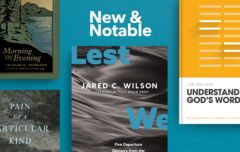One of my favorite questions for times of small talk is “Why do you do what you do instead of doing something else?” Or sometimes a variation: “Why do you love what you do?” I ask this when I’m in the barber’s chair, on the x-ray table, or trying to articulate words as the dentist rummages around in my mouth—just about anywhere a person has devoted themselves to a particular vocation. My favorite answer so far has been from a dermatologist: “I work dentist hours but make doctor money.” Clever!
Of course, not everyone has the privilege of doing what they love and that comes out in conversation as well. I have met Uber drivers who immigrated to Canada and, as they did so, lost their engineering credentials. I have met people who were forced by their parents to pursue a field they didn’t care for and people who, through the vicissitudes of life, ended up doing something that engaged little of their passion and few of their skills.
My dad devoted the best of his life to landscaping. And while he loved the design aspect of the job, he also loved the actual work. In most of my memories of him, I picture him digging deep holes to plant trees, lugging huge rocks to build walls, laying bricks and stones to build pathways. He was rarely happier than when he was straining and sweating, combining artistry and brute strength to design something beautiful.
But his path to landscaping was not an easy one. Dad grew up a son of privilege and received little affirmation from his family when it came to his love for the natural world. I never met my grandfather so do not know whether he made dad feel that landscaping was beneath a Challies or whether he had just a bit of a complex about it and assumed his father’s disfavor. Either way, he ended up dedicating most of his life to doing what he loved, but I’m not convinced he always did it with a lot of confidence. I think he often felt the judgment of other people, whether real or imagined. That’s kind of tragic now that I think about it.
I am not the kind of person who dwells much on the past or who allows myself to look back with regret. Why should I remember what God has forgotten? What good does it do to glance backward? (The answer: usually about as much good as it did Lot’s wife.) Yet I do sometimes consider this: I wish I had thought to ask dad why he loved to do the job he chose to do.
Why should I remember what God has forgotten? What good does it do to glance backward?
Dad had skill and passion for landscaping and I wish I had thought to ask him why he loved it the way he did. What do you love about designing gardens? What do you love about hard manual labor? And then the more detailed questions: How do you decide which plants belong in which spots? How do you decide which plants complement one another? What do you love about this particular plant and that particular flower? What are you trying to accomplish in this garden? But, alas, to my recollection I asked none of these questions. I received none of the answers. And while I know what dad dedicated his life to, I don’t really know why.
When I ask others why they do what they do, I’m often blessed to hear them describe their love for things I’ve never considered lovable: crafting beautiful smiles from misaligned teeth, bringing order from numerical chaos, instructing children in the basic skills of life. As I listen and ask follow-up questions, I learn—I learn to appreciate what I have often never considered before and even what doesn’t especially enthuse me. God is good to give human beings skills and passions and good to allow us to express them in our vocations. He is good to allow our enthusiasm about these things to be transferable and contagious.
One thought that comforts me as I consider gifts, passions, and talents, is that I’m reasonably certain they carry over from this life to the next. After all, we carry over from this life to the next, and surely not as people who are made into entirely new individuals and given entirely new personalities, but as people who, though forgiven, restored, and perfected, are still ourselves. If this is the case, then those who have not been able to do what they love in this world will be able to explore it in the next. Those whose talents have laid dormant through difficult circumstances or whose passions have been sublimated to the call of duty need only wait, for eternity will dawn with fresh and unending opportunities to engage every good desire.
And for those of us who wished we had asked the questions and learned from another person’s interests, eternity offers a second opportunity to do so—to learn how they love to glorify God through the way he made them and through their expression of what he has entrusted to them.










